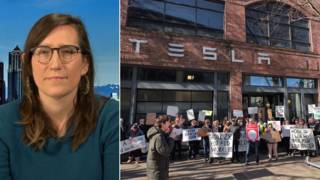HeadlinesMay 31, 2016
More Than 700 Refugees Drown in Mediterranean in Three Days
More than 700 refugees have drowned in only three days, as border crackdowns across Europe have forced refugees to make more dangerous journeys across the Mediterranean. The United Nations Children’s Fund says many of the victims were youth fleeing war and violence in their home countries. The majority of the refugees were from Eritrea, Nigeria, Somalia and South Sudan. Under a European Union plan enacted in April, all refugees arriving in Greece are deported back to Turkey, forcing people to attempt the more dangerous route between Libya and Italy. On Monday, the photo of a German volunteer from the group Sea-Watch holding the body of a drowned child became the latest symbol of the migration crisis. Sea-Watch spokesperson Ruben Neugebauer spoke out.
Ruben Neugebauer: “It’s always a difficult decision to publish such a picture, but in this specific case we decided to send the picture out because of the graveness of the situation. We thought that this material needs to be published because what we see here is the effect of European foreign policy.”
Chad: Ex-Dictator Hissène Habré Convicted of Crimes Against Humanity
In a historic ruling, the former dictator of Chad, Hissène Habré, has been convicted of crimes against humanity and sentenced to life in prison. Habré is accused of killing as many as 40,000 people during his eight years in power in the 1980s. He was tried in a special African Union-backed court established after a two-decade-long campaign led by his victims. This is the first time the leader of one African country has been prosecuted in another African country’s domestic court system for human rights abuses. We’ll have more on the trial with Human Rights Watch’s Reed Brody later in the broadcast.
Bernie Sanders and Hillary Clinton in Dead Heat in California
In news from the campaign trail, Democratic presidential candidates Bernie Sanders and Hillary Clinton are both campaigning in California ahead of the June 7 primary, where polls are showing the two in a dead heat. Clinton was in her home town of Chappaqua, New York, this weekend, but has canceled some campaign stops in New Jersey to add more stops in California. She spoke at a small community meeting in Oakland on Friday.
Hillary Clinton: “I really think one of the best ways that I can be a good partner is to lift up what is working and lift up people who are trying to work together, and using the White House. And I like to say, you know, yes, we can use the White House as a bully pulpit. We don’t want a bully in the White House, but we can use the bully pulpit to talk about issues.”
Bernie Sanders has focused his campaign energy into the California primary in recent weeks. He spoke at a rally in San Pedro on Friday.
Sen. Bernie Sanders: “Our ideas and belief in economic justice, in social justice, in racial justice, in environmental justice, in immigration reform and a path toward citizenship, in rebuilding inner cities throughout this country, in protecting the needs of the Native American people, our ideas are the future of this country.”
On Sunday, Sanders visited the original Delano headquarters of the United Farm Workers union, where he reiterated his call for a national ban on fracking when asked what he would do about poor water quality in the San Joaquin Valley. This comes as environmental groups are criticizing the Obama administration after two federal agencies finalized reports claiming fracking off the coast of California would pose no “significant” risk to the environment. The announcement of the reports by the U.S. Bureau of Ocean Energy Management and the Bureau of Safety and Environmental Enforcement ends a court-ordered moratorium on offshore fracking, which was put into place earlier this year after the Center for Biological Diversity challenged the administration’s practice of “rubber stamping” offshore drilling without an environmental review.
Donald Trump Backs Out of Proposed Debate with Bernie Sanders
Meanwhile, in more news from the campaign trail, Bernie Sanders is criticizing Donald Trump for backing out of a proposed debate between the two candidates ahead of the California primary. Donald Trump first agreed to the idea when it was proposed by Jimmy Kimmel during an interview last week. Sanders quickly signed on to the idea. But Trump then backed out of the idea on Friday, saying in a statement, “Based on the fact that the Democratic nominating process is totally rigged and Crooked Hillary Clinton and Deborah Wasserman Schultz will not allow Bernie Sanders to win, and now that I am the presumptive Republican nominee, it seems inappropriate that I would debate the second place finisher,” Trump said. In response, Sanders asked what Trump was afraid of.
Sen. Bernie Sanders: “Well, it’s the first that I heard about it. I heard that he was going to debate me, then I heard that he was not going to debate me, then I heard that he was going to debate me, and now you’re telling me that he is not going to debate me. Well, you know, I hope that he changes his mind again. I mean, Mr. Trump is known to change his mind many times in a day. And I would—you know, Trump goes around, he’s a bully. He’s a big, tough guy. Well, Mr. Trump, what are you afraid of?”
Trump Ordered to Release Internal Trump University Documents
Meanwhile, Donald Trump is being forced by a federal judge to release internal Trump University documents amid an ongoing lawsuit arguing the defunct for-profit school defrauded students. On Friday, Trump went after the judge, Gonzalo Curiel, during a campaign rally in San Diego.
Donald Trump: “I have a judge who is a hater of Donald Trump. A hater. He’s a hater. His name is Gonzalo Curiel. The judge, who happens to be, we believe, Mexican, which is great, I think that’s fine. You know what? I think the Mexicans are going to end up loving Donald Trump when I give all these jobs, OK?”
That was Trump speaking in San Diego. Outside the rally, thousands of people protested Trump’s positions on immigration, which include building a wall across the entire length of the border and deporting 11 million undocumented immigrants. At least 35 people were arrested.
Trump says he’s planning to release the documents on Trump University today. He is also expected to announce the names of the charities selected to receive the $6 million Trump says he’s raised for veterans.
Meanwhile, Donald Trump is facing criticism for referring to Massachusetts Senator Elizabeth Warren as “Indian” and “Pocahontas” multiple times last week. Elizabeth Warren says her family is part Cherokee. Trump’s comments have sparked protest from indigenous people, including from Cree Nation reporter Nicole Robertson, who yelled that Trump’s comments were “offensive” in the middle of his speech in North Dakota last week. Robertson later spoke on MSNBC.
Nicole Robertson: “You look at the number of women that have been victimized through either missing and murdered indigenous women that’s happening continent-wide, human trafficking. And so, to use the word 'Pocahontas,' it just brings to mind derogatory comments that are not—in this day and age, a word that’s just not usable.”
Argentina: Ex-Dictator & Ex-Officers Convicted for Role in Operation Condor
In Argentina, ex-dictator Reynaldo Bignone and 14 other former military officials have been sentenced to prison for their role in the secret 1970s international kidnapping plot known as Operation Condor. The operation was a campaign of coordinated terror and assassinations carried out by regimes in Chile, Argentina, Bolivia, Brazil, Paraguay and Uruguay. Lawyer Luz Palmas Zaldúa spoke after the verdict Monday.
Luz Palmas Zaldúa: “This ruling determines not only that state terrorism in Argentina was a criminal conspiracy, but also the repressive coordination with other dictatorships. These states worked together illegally to maximize efforts to persecute the political opposition from each of the dictatorships, and to 'disappear' or eliminate those who were considered to be with subversive groups, groups who confronted the dictatorships in Southern Cone countries.”
Brazil: 2nd Minister in Interim Gov’t Steps Down over Leaked Recordings
In Brazil, a second minister in the interim government has resigned. Fabiano Silveira headed the ministry tasked with fighting corruption. Yet he resigned Monday after a recording surfaced of him attempting to block an investigation into corruption at the state-run oil company Petrobras. Last week, the planning minister for the interim government also resigned after explosive transcripts revealed how he plotted to oust President Dilma Rousseff in order to end a corruption investigation that was targeting him.
Philippines: Journalist Alex Balcoba Murdered in Manila
In the Philippines, journalist Alex Balcoba was murdered in Manila Monday by two gunmen. Balcoba was a reporter for the People’s Brigada tabloid. The Philippines is one of the world’s deadliest countries for reporters; more than 30 journalists have been killed under President Aquino’s administration. His murder comes one day after the Philippines Congress officially declared Rodrigo Duterte the next president. Duterte has admitted to his role in death squads, joked about the gang rape of an Australian missionary, and pledged to kill tens of thousands of people.
Egypt: Head of Journalists Union Facing Trial Amid Media Crackdown
Meanwhile, in Egypt, the head of the journalists union and two of the union’s board members are facing trial on charges of harboring opposition journalists—in the latest crackdown against press freedom in Egypt. The charges stem from a raid on the journalists union’s headquarters in May, where authorities arrested two reporters working for the opposition website Bawabet Yanayer.
Iraq: 20 Killed in Baghdad; Fighting Between ISIL and Iraqi Forces in Fallujah
In Iraq, more than 20 people were killed in a series of bombings in Baghdad Monday. The attacks come amid fierce fighting between U.S.-backed Iraqi forces and militants with the self-proclaimed Islamic State over control of Fallujah, which was seized by ISIS in 2014.
French Railway Workers Set to Join Growing Strikes over Labor Reforms
French railway workers are set to join the growing strikes, which are threatening to immobilize the country amid protests over labor reforms. Last week, workers at refineries and nuclear power plants went on strike, creating fuel shortages across the country. Unions are protesting reforms that would make it easier to fire workers, among other provisions. France is slated to host the Euro 2016 football championships next week.
Eric Holder Says Edward Snowden Performed “Public Service”
Former U.S. Attorney General Eric Holder has said NSA whistleblower Edward Snowden performed a “public service” by leaking documents revealing NSA mass surveillance. Holder made the comments while speaking on a podcast hosted by David Axelrod.
Eric Holder: “We can certainly argue about the way in which Snowden did what he did, but I think that he actually performed a public service by raising the debate that we engaged in and by the changes that we made.”
This comes as Edward Snowden is calling for an overhaul in whistleblower protections, after former senior Pentagon official John Crane has spoken out publicly about how his superiors broke the law to punish a key National Security Agency whistleblower for leaking information about waste, mismanagement and surveillance. Click here to see our exclusive broadcast interview with John Crane.
Verizon Workers Declare Victory After 7-Week Strike
And after nearly seven weeks on strike, tens of thousands of Verizon workers have declared victory. It was one of the biggest U.S. strikes in years, as workers fought Verizon’s efforts to cap pensions, cut benefits and outsource work to Mexico, the Philippines and the Dominican Republic. Under a deal announced Monday, workers will receive a nearly 11 percent raise over four years. The deal also decreases Verizon’s ability to outsource work. Last week, Verizon worker Pamela Galpern spoke with Democracy Now! about the strike.
Pamela Galpern: “For a company that’s as profitable as Verizon, I think it was clear that we—that wasn’t right, that it’s not right that they want to take so much from the workers who have helped make this company so profitable. This strike is really about keeping good jobs here, and it’s about our families. It’s 39,000 workers on strike, and it’s the families of all of those workers.”
Most popular
- 1
- 2
- 3
- 4
Non-commercial news needs your support
Please do your part today.











Media Options